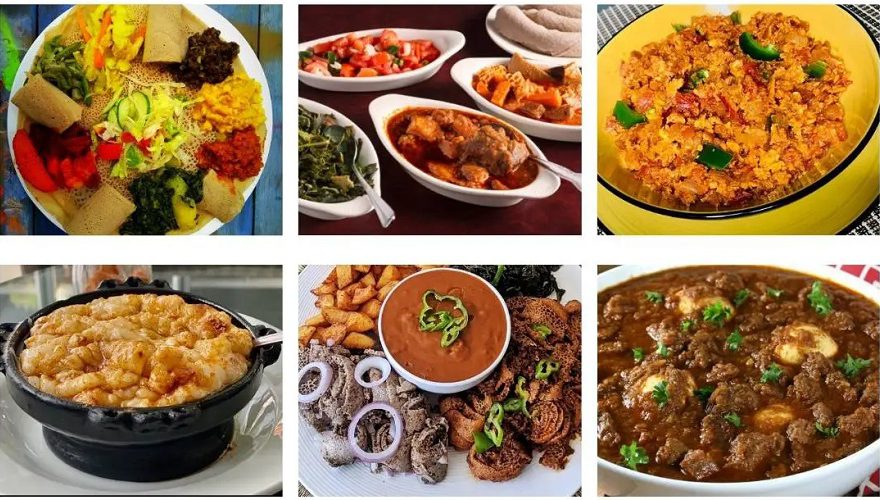
Ethiopians are not only spiritually motivated and God fearing people. They are also resilient, hopeful having great survival instincts that no hardships can break. Life might sometimes be as hard as possible but Ethiopians have a way of making it fun despite the sharp rise in the costs of living these days. By the way this is not the first time for Ethiopians to face such hardships. Roughly the last fifty years after the 197 Revolution have seen many difficult times.
The revolutionaries of the time were often telling people that things could go worse before they could get better and some revolutionaries had eaten their belts (not a savory thing to do anyway!) when famine struck. They said that the people would eat cornflakes for breakfast once the bad days will be gone. Nowadays the revolutionaries have overcome those bad days and the grandchildren of the “belt eaters” are now some of the overweight kids in the world eating the best foods even by Western standards. How about us? Where are the hard talking revolutionaries who promised better days half a century ago?
At one time in Addis bread was in such a short supply that people formed long queues in front of bakeries at five in the morning. When meat was expensive as it is at present, they resorted to killing oxen in their neighborhoods and share the meat among the members of the group of people who contributed money according to the size of their pockets. When industrial beer became expensive as it is now, they drank tella, or the home-brewed alternative adding araki, a kind of strong liquor like the Mexican tequila to make it stronger and creating a mellowing high. Hardships and drinks seem to make good companions in Ethiopia.
Generally speaking a New Year is a time of renewal both on individual and national levels. Individuals make what is known as a New Year pledge or decision to start life anew or introduce changes in their lives. Nations us New Years in orderto make new plans for the nation. They plan to develop the economy, improve people’s lives or start to build a new future depending on the specific circumstances or conjectures. All in all a New Year is a time of hope, and a time of preparations for better achievements. Unfortunately, there are many countries in the world that are spending New Years without even being aware of them.
One of the mysteries of Ethiopian culture is reflected in its calendar. By the way Ethiopia has a unique calendar that sets her apart from the Gregorian calendar adopted by the most of humanity. The Chinese too have also a different way of counting the year. They have a new Chinese New Year they call after different animal names.
According to Encarta Encyclopedia, “Chinese New Year, also known as Lunar New Year, celebration of the New Year in Asian communities around the world. The date of the New Year is determined by the lunar calendar, so festivities begin with the new cycle of the moon that falls between January 21 and February 19. Each year is named for one of 12 symbolic animals in sequence. The animals, in their sequential order, are the rat, ox, tiger, hare, dragon, serpent, horse, ram, monkey, rooster, dog, and boar.
New Years are celebrated in different ways in different cultures. In Ethiopia, the New Year falls at the end of the rainy season when the downpours of the last three months are reduced to light showers and the sun which was timid for three months starts to turn brighter and even hotter. Preparations for the New Year usually start a few weeks before the actual day.
The New Year day is a time if great festivities and traditional foods are making a huge comeback once again and meaty dishes dominate the menus. The best and worst of Ethiopians’ food and beverages culture rear their heads. When you talk about holidays in Ethiopia, you mostly talk about foods.
There is a popular saying in Ethiopia that holidays don’t feel like holidays without meat and meat-based foods. We can also add butter to this. Meat goes with butter, the one reinforcing the positive effects of the other. Ethiopians may speak dozens of languages but they eat almost the same popular dishes particularly during holidays. They have a hidden contempt for fasting dishes and most of them wish that they could always eat meat. Ethiopians’ fascination with meat in all its forms and shape is legendary to say the least. They associate eating meat with good times and happiness and even wealth. If someone eats meat most of the week, he or she isconsidered someone enjoying a good life. If you ask someone why they are strong and good looking, they tell you that they were raised on meat, butter and honey. There may be some truth in this but it is far from being the whole truth.
The positive attributes meat and butter enjoy in Ethiopia are not due to the highprices you pay for them than ordinary dishes, at least on holidays. On the contrary, even if you are a pauper, you can feast on sub-quality meat sold at butchers’ at discount, chopped from different parts. These are small pieces of meat called kinitabi or small cut pieces and sold at discount. I remember the time when someone could buy a big chunk of kinitabi enough for five people for a more 50 cents. I think these chunks of low-cost meat are no more visible on the butchers’ tables for sale. Why? Maybe they are as expensive as the other meat.
Unfortunately these days meat and butter consumption is associated with heavy consumption of these healthy but potentially deadly foods. Many ordinary people in the rural areas as well as diehards of the meat culture do not subscribe to this view. If you raise the specter of bad health in connection with meat and butter, they will certainly and proudly tell you that their forefathers were living exclusively on meat and butter and suffered none of the modern illness.
However, they forget that even if people from the older generation were consuming a lot of meat and butter, they were burning them in the field during the times of hard labor where they have been working the land from dusk to dawn. In other words, the older meat fans were exercising in the fields while their modern counterparts drive in cars or stay all days in one place, thereby showing early symptoms of the food related diseases and spend their rest of their lives swallowing pills.
In some cultures, there are misconceptions about the negative effects of these fatty foods, namely meat and butter. On Meskel holidays, the gurage people of south-western Ethiopia consume a lot of meat and butter. They don’t bother about eating too much of these things as a matter of culture or habit and they would tell you that they take a potent drink called araki to neutralize the ill effects of these fatty foods.
Alcohol taken in moderation is believed to help speed digestion. Yet, too much alcohol is also a source of many ailments including liver complications. And many people in the rural areas are not consuming alcohol in moderation. They drink as if the end of the world is fast approaching and suffer from complication starting the same afternoon the feast take place.
We may ignore the worst effects of too much of something, but the truth is what we consider expensive or tasty is not always the best food. I remember an advertisement on CNN was mentioning Ethiopia’s fasting foods as being one of the healthiest in the world worth testing. These fasting foods are nothing more than injera, shiro wot, lentil sauce, raw tomatoes. green pepper, turmeric and others considered by the medical world as the sources of the best and healthiest ingredients recommended by modern dietitians. But here in our country these items are considered signs of poverty and shunned. If you suggest eating some of these foods on holidays, I am sure you will be regarded as a lunatic and will be left alone to enjoy you chosen poor man’s fasting foods.
Ethiopian New Year is not only about foods and beverages. It is also about togetherness (despite the presently isolating effects of COVID-19) union, good wishes, sharing, and blessings. COVID-19 has changed many of our healthy habits. It has prevented us from coming together and invite one another to tasty meals, songs and dances. These things are now becoming sources of much nostalgia and loneliness. Yet there is no choice other than respecting the COVID-19 protocols of mask wearing, social distancing and hand washing.
You cannot avoid COVID-19 because you are enjoying in families. There are many stories of families who caught the virus while enjoying in groups. Ethiopia is now the fifth African countries where COVID has become deadliest and infections are goring at an alarming rate. Ignoring these facts would be suicidal. No amount of butter and meat as well as alcohol will protect us from the virus. No amount of love for our families would spare us from the infections.
Going out for eating or drinking in groups or for taking family pictures or enjoy the festivities in nightclubs have also become deadly. The source of our neglect might be the consumption of more than enough alcohol which MIGHT make us feel invincible even to COVID-19.So, the most prudent thing to do would be to stay safe, and spare the joy for another holiday free from the virus. There is always another day for happiness as long as we keep ourselves safe. One could write volumes about Ethiopians’ food and beverage cultures that are not yet properly explored and studied. Suffice it to say that Ethiopia is rich in many food and drinks while the task of choosing which is what is up to we, the consumers.
MULUGETA GUDETA
The Ethiopian Herald September 24/2023




